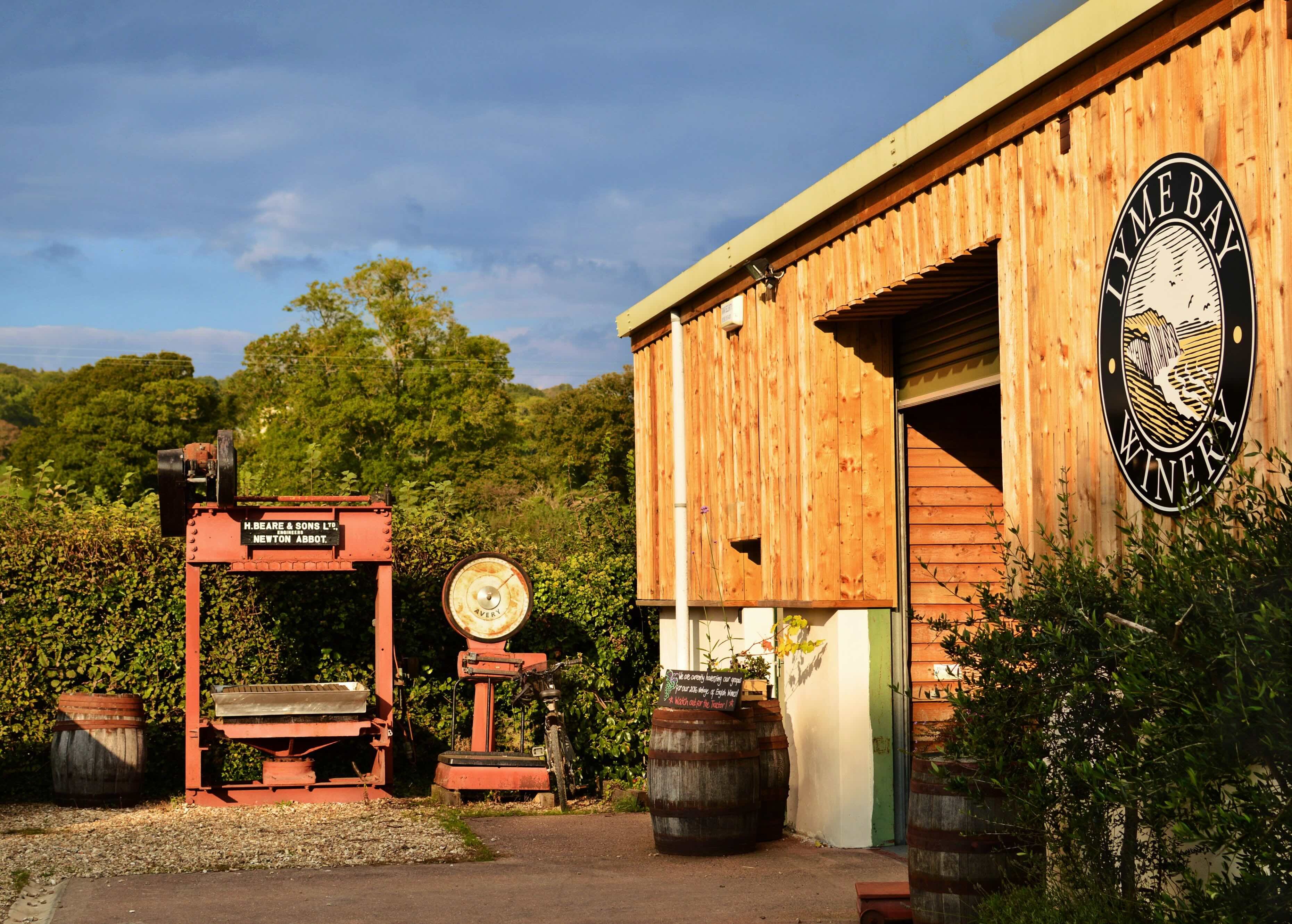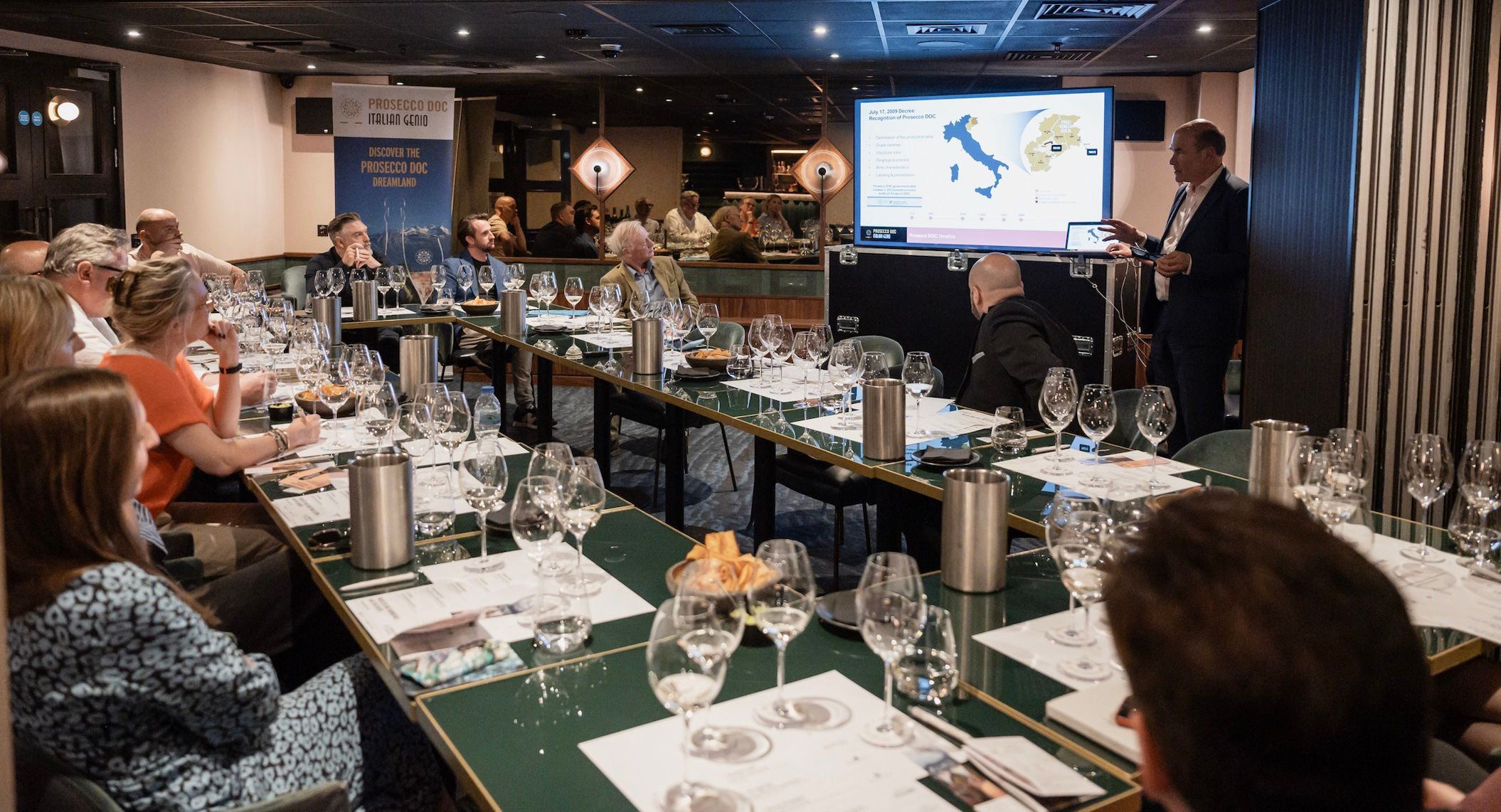For many, including The Buyer, it was the first time to get back to doing business at ProWein and join the near 50,000 visitors who made the journey to Düsseldorf last week. Richard Siddle gives his personal assessment of the ProWein (and Kylie) experience in the first of two reports to be published this week.
You only had to spend a little time in the cut and thrust of the trading halls of ProWein last week to appreciate just how quickly the global wine industry moves.
Less than six months ago, at the World Bulk Wine Exhibition in Amsterdam, all the talk was of glass shortages and crippling increases in costs for everything from cardboard, to labels, to screw caps. So much so that decades of trading practices were being ripped up as retailers agreed to open up previously water tight trading contracts to factor in the increased supply chain, glass and packaging costs. New trading rules were being devised and written over the two days of the show – just so buyers and producers could do business with each other.
Fast forward to Wine Paris & Vinexpo Paris in February and the talk was all about how well how those changes were being implemented and how long term would they be.
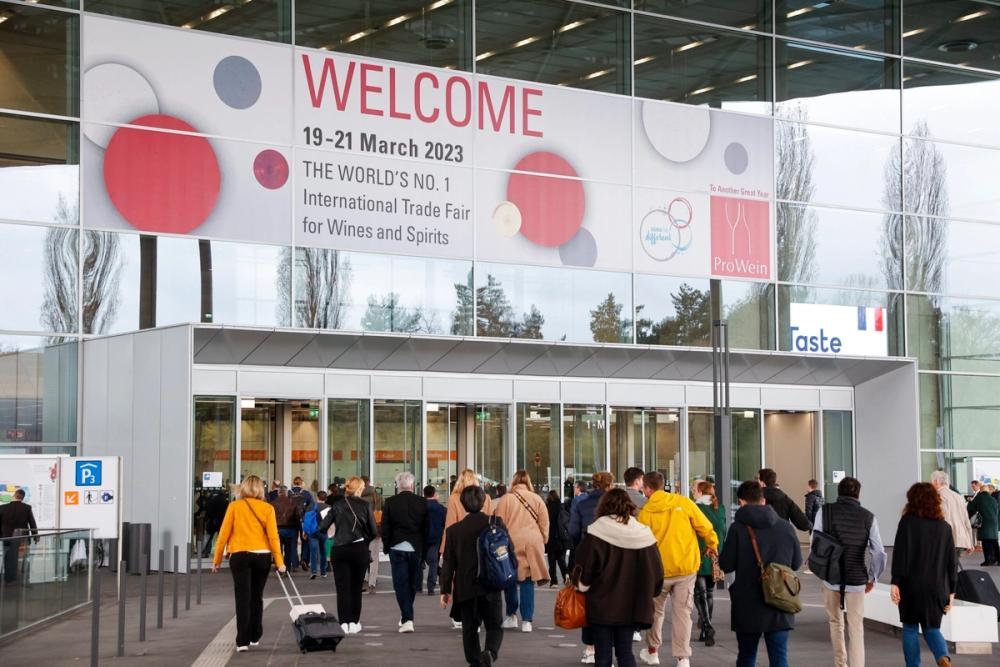
Visitors from 141 descended on Dusseldorf last week for the latest edition of ProWein
Which brings us to ProWein and arguably still the most important and influential trade show – the most international of international trade fairs with 86% of exhibitors coming from outside Germany and visitors flying in from 141 countries.
Onwards and upwards
Intriguingly all the doom, gloom and fears that dominated WBWE, and were still there in the background at Wine Paris & Vinexpo Paris, were significant by their absence at ProWein.
Not that the supply chain, glass and cost issues have gone away, it was more producers, importers and buyers wanting to move on and focus on the future and finding new solutions.
Matthew Johnson, co-founder at Beyond Wines, summed it up well when he told The Buyer that “packaging and logistics are still a big issue, but the talk is softening”.
Rather than scratch heads and grumble the mood at ProWein was about how we are going to fix these issues.
Richard Dennis, commercial director at Watermill Wines, said: “There was a strong sense of ‘let’s get on with it’, from all sides of the fence. Producers are more resilient and planning further ahead than ever before, coupled with retailers who have adapted to be more practical and open-minded about solutions.”
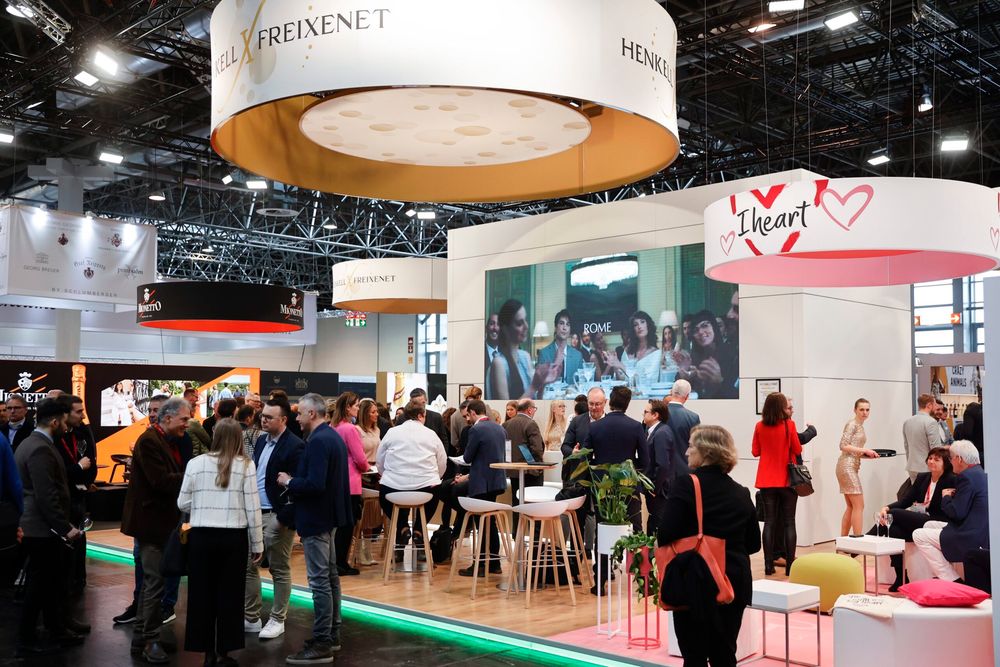
New branding for I Heart wine – with an emphasis on the ‘Heart’ – was unveiled on the Henkell Freixenet stand which is to be rolled out starting in the UK in the autumn
ProWein was the time to make the most of the situation we are in and look for new opportunities. Be it Freixenet Copestick revealing a major brand overhaul for I Heart Wines to be released in the autumn, or Kylie Minogue causing a commotion by turning up at the fair with her own stand to personally promote her breakthrough wine brand (8m bottles sold in three years) and launching an alcohol-free sparkling rosé.
WineGB was there on the front foot with a group of top producers all making big strides with their wines around the world. “This is a very important show for us. We can cover the whole world in one go and there are key international buyers here,” said Simon Thorpe MW, Wine GB’s chief executive.
Sam Linter, managing director of Bolney Wine Estates said although it had been coming to ProWein for 10 years it was still important to be there to get its brand known internationally. “It is important we as an industry are here to show we are a serious wine producing country and want to grow our export business.”
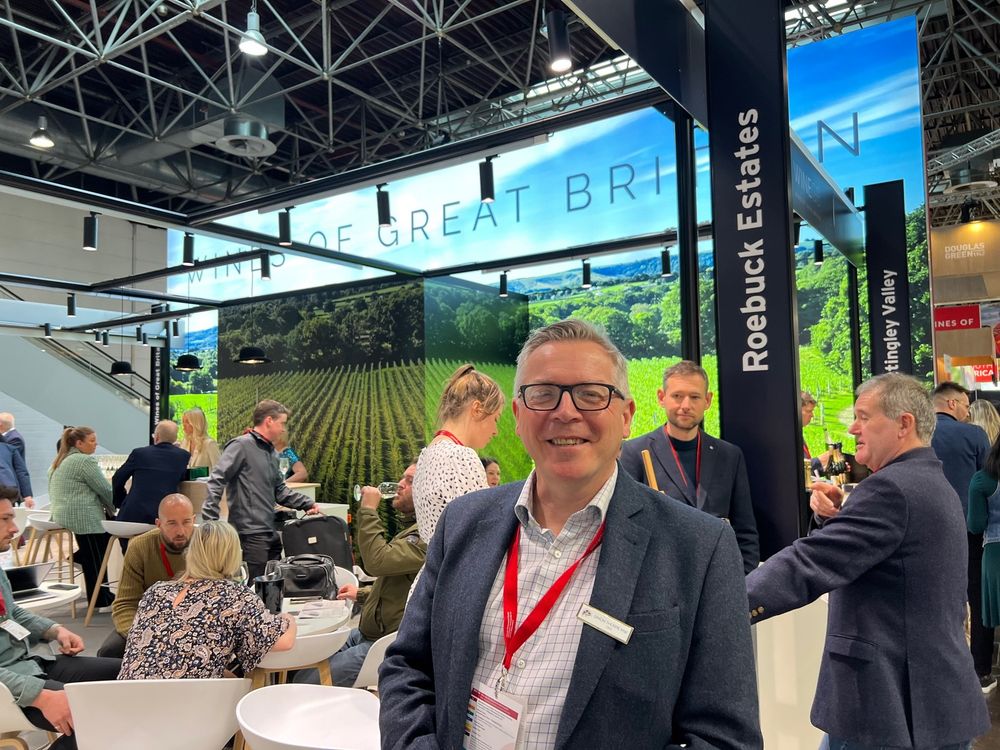
Wine GB’s Simon Thorpe MW lead a strong delegation of premium English wineries at the show further cementing the UK’s position as a series wine producing country in its own right
Sourcing and securing
It’s also the show to get your buying book out, orders in and sourcing secured, said Hugo Campbell, director at Ehrmanns. With Argentina suffering its worst harvest in decades it was vital he and his team were there to secure what they can for its Beefsteak range, plus look for Malbec alternatives, in particular, from other South American markets. ProWein is certainly the fair if you have a multi-country varietal brand as strong as Beefsteak which was up 18% year-on-year and up 165% in sales since 2019 and is now in 30 countries, said Campbell.
“The big change was the range out of reds and its whites and rosés,” he added where it has been able to work with producers in Chile and Portugal.
“Security of supply (and also security of demand and commitment) were paramount, and both respected equally. This is now what is vital to trading effectively and growing business,” said Dennis.
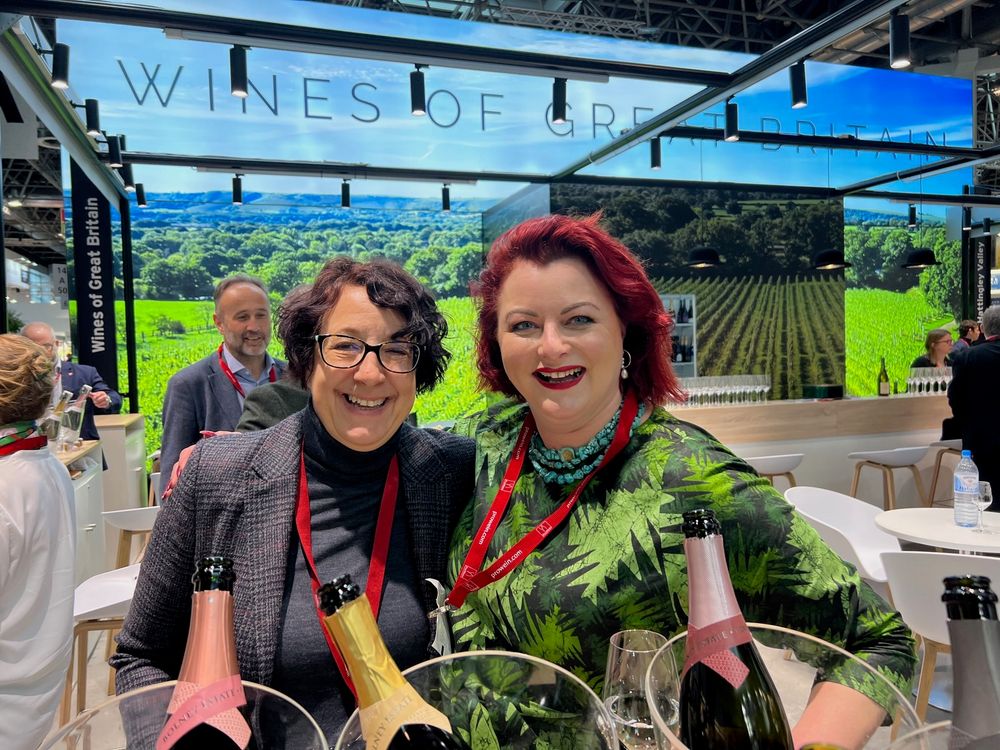
English producer Bolney Wine Estates’ Sam Linter and Helen Chesshire were delighted to be back at what was the producer’s 10th time at the show
It’s a similar story for Freixenet Copestick and sourcing wine for its multi-country, varietal mega brand, I Heart Wine, which is now selling over 30m bottles a year.
“We invest our time finding the best wine at the best price and are very flexible,” said Robin Copestick, co-managing director of brand owner Freixenet Copestick. It can also take advantage of the huge buying and sourcing capabilities within not just its own team, but its owners Henkell Freixenet.
The two teams were at the show to get behind the re-launch of I Heart wine that is due to be rolled out in the UK first in the autumn, with other markets following at the right time afterwards.
“We have done a lot of consumer research and found it was actually not that clear to consumers that its ‘I Heart’ wine and would often refer to it as ‘I Love’. We want to correct that perception,” said Copestick.
Elephant in the room
Official figures say visitor numbers were 49,000, but on the ground it felt there was a big difference in interest and buzz around the New World halls than there was in the halls of the traditional north European wine producing power houses. The 49,000 figure is also down on the 61,500 who came to Dusseldorf for peak ProWein in 2019, the last show to be held before the global Covid lockdown.
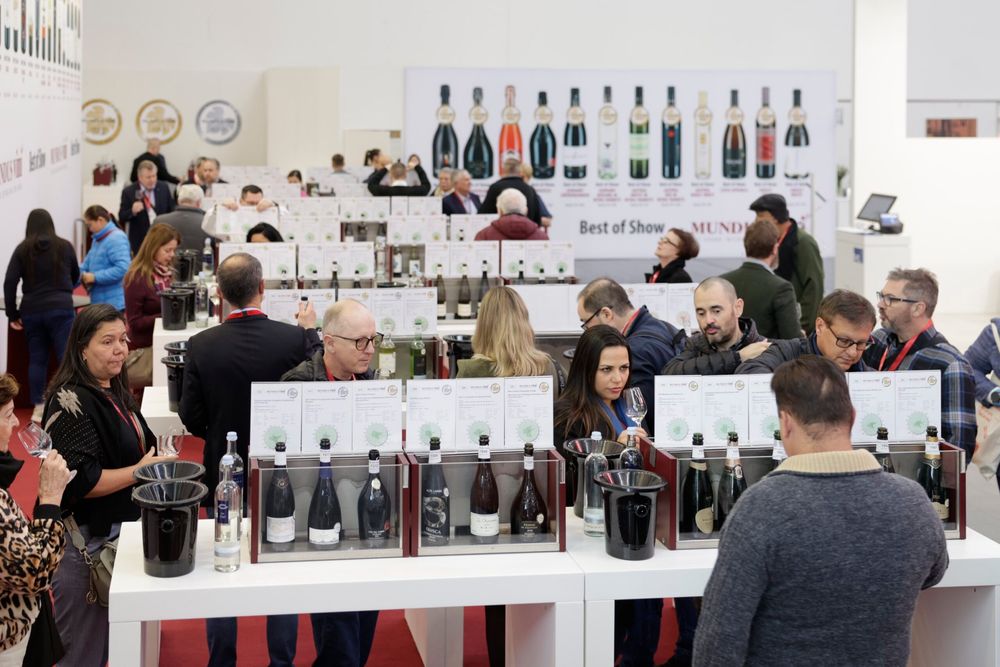
Figures for last week’s ProWein show visitors were down from 61,000 in 2019 to 49,000 but exhibitor numbers had remained the same at around 6,000
Which probably reflects the big elephant in the room – Wine Paris & Vinexpo Paris. The impact of its show in February was still reverberating around the halls at ProWein. For the first time in over 10 years ProWein has got some serious competition on its hands and it was clear some buyers and visitors who would normally have come to ProWein had been and done their business in Paris.
How many will follow suit and only head to Paris in February 2024 was the big underlying question being asked around ProWein. Not helped by two days of train strikes that hammered the usually super efficient logistics of getting to and from the show. Dusseldorf’s taxi drivers were the big winners from this year’s ProWein.
Bernard Fontannaz, founder of Origin Wines, in South Africa said the pressure was on ProWein to reinvent itself and ensure it still stays important for businesses like Origin.
“We come to these fairs to generate new business and meet our existing customers. You have to ask if the model is still relevant. What are the organisers doing to get new blood into the fair?” he asked.
“Seven or eight years ago the fair was all about new business,” added Jon Woodriffe, Origin’s sales director, who was also quick to say the quality of UK buyers and customer at the show “was as good as any year”.
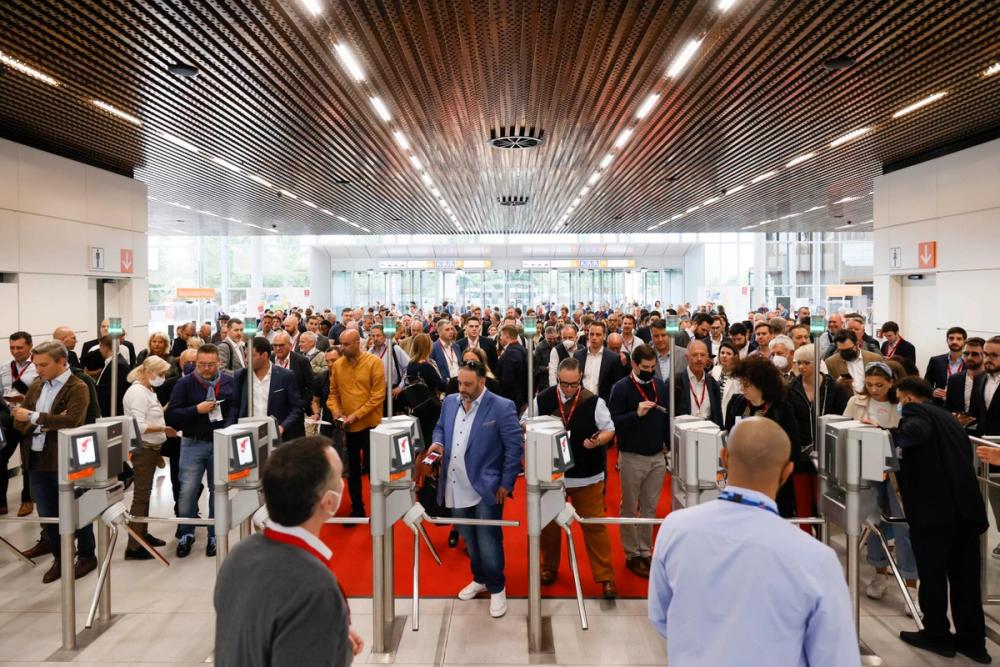
With two major trade fairs happening within a matter of weeks of each other in Paris and Düsseldorf, buyers and producers alike are increasingly going to have a choice to make about which show they attend, if they can afford or want to do both and if they do how they manage their resources and time.
Two’s company
The most likely scenario is the two shows can actually benefit from each other and offer the global wine industry a more effective way of doing business across both events. It will also be good for the industry as a whole as it will force both to raise their game. Plenty of producers, importers and buyers will look to do both and divide and conquer what they need to do where. But then it is far easier to do that if you are in Europe and not having to travel from the other side of the world to do business twice in a matter of weeks.
Dennis at Watermill Wines said: “ProWein is always going to be a useful one-stop shop for UK buyers, but I can see the benefit in taking some of the pressure away from it and using Wine Paris & Vinexpo Paris and Vinitaly more effectively. I’ve always thought UK visitors’ time at ProWein should really be focused towards the southern-hemisphere producers who are more difficult to see regularly and have made the most effort to attend the event.”
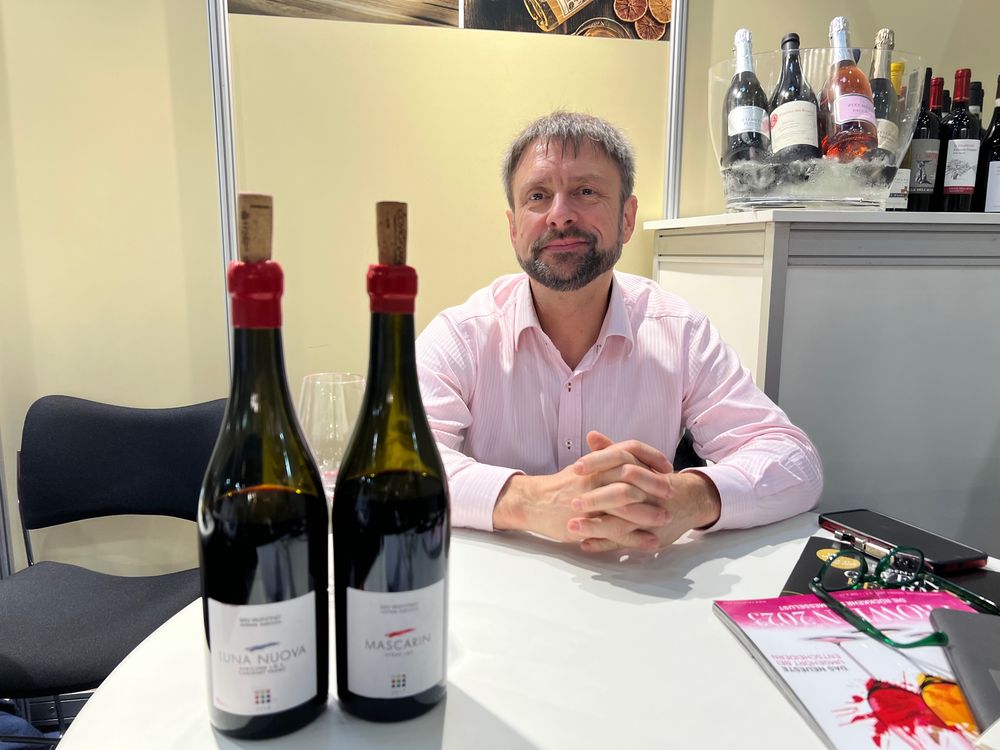
Winetraders’ Michael Palij MW is a long time supporter of ProWein and remains unique in attracting so many international buyers
Michael Palij MW, owner of Winetraders, agreed it is actually VinItaly, being an Italian specialist, that was more of an alternative to ProWein and it was still important for him and his team to be doing both shows. “This is our eighth time here. It’s an important show and we’re able to talk to a lot of our buyers here,” he says. “The reason ProWein is good is it’s so international and we can also do a lot of sourcing from here around the world.”
It’s also an ideal platform for Winetraders to showcase the best of what it has found in Italy. “Italy is riding high and is just extraordinary at the top end. I have never seen it before. Piemonte is unstoppable at the moment and Sardinia is the one to watch. It’s the last place in Italy to discover with a new generation of winemakers doing amazing things.”
Duty forces alternative strategy
For the UK wine trade it was the first time it could come together and meet their producer partners around the world and try to come to terms with the biggest rise in wine alcohol duty since 1975 – nearly 20 years before ProWein was even born. There were, no doubt, some difficult conversations to be had about just how those increased duty costs were going to be applied with the common consensus being this was too big a jump in duty for retailers and customers to expect their suppliers and producers to absorb.
“We have not discussed yet with the major retailers how they are going to handle the duty changes. But the amount is too big for them to push back to producers,” said Copestick.

Origin Wines’ Bernard Fontannaz said the big jump in UK duty could act as “Tesco’s screwcap moment” and see a big switch to alternative packaging formats
Fontannaz at Origin Wines said the big jump in duty was a shot across the bows of the sector and businesses “have to be more critical of what they do”. Particularly if you are competing at the low price points where alternative formats and lighter PET bottles now make more sense.
“It could be the momentum switch to seeing private label at under £5 in PET,” he added. “Alternative packaging will have to come to keep wines affordable. It is also the best way to bypass the glass suppliers by finding an alternative to work with. We have to get the gatekeepers to back new packaging. We need another Tesco screwcap moment. We need leaders in the market. Something has to change. We need to give consumers an informed choice.”
Cramele Recas, Romania’s biggest wine exporter, was inundated with buyers from around the world wanting to look at the packaging solutions it is coming up with, particularly its recycled PET bottle project that claims to be not only cheaper to produce than glass but emits up to 10 times less carbon emissions.
“It got a lot of interest from a number of key retailers,” said Johnson at Beyond Wines, its UK partner. “Some who had not made appointments to see us made a beeline for Recas over the three days to discuss new packaging.”
If buyers were looking for alternative packaging there was plenty to find at the show with cans, bag in box, and plastic bottles all vying for attention. “We have had lot of interest in all our packaging formats be it cans, 187mls, to magnums,” said Lanchester Wines’ sales director, Mark Roberts, with buyers now pleased with the quality they can get.
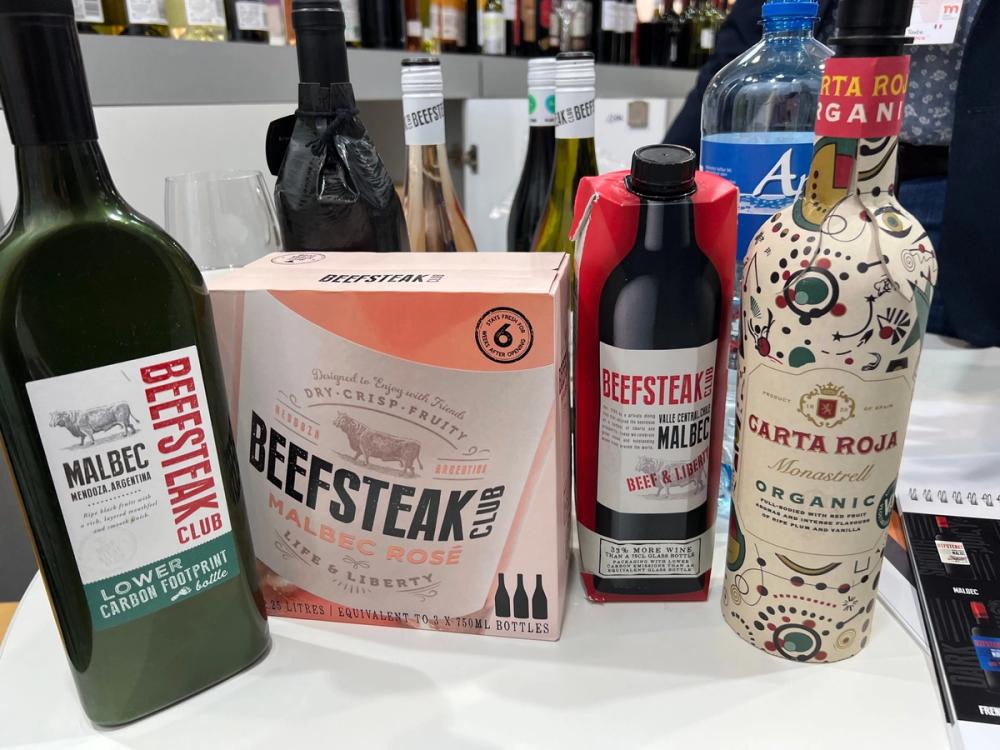
Ehrmanns was showing its customers around the world the range of alternative formats it can now offer
Campbell said Waitrose’s decision to switch its small bottles into cans has really helped drive momentum behind canned wine across the market. “We have moved Beefsteak small bottles from glass to can and it has worked really well. We are also seeing more brands going into cans – that is how we are going to get category growth. It’s only a matter of time before the on-trade opens its doors as well to cans. It also has the sustainability and convenience story as well.”
He said the opportunity for alternative packaging is clearly there and consumers say they want to buy more sustainable packaging, so it is up to the industry, and major retailers “to give them a reason to do so”. Its 3 bottle equivalent bag in box for Beefsteak, for example, uses seven and a half times less carbon emissions.
Ehrmanns is also looking seriously at Tetra Park, flat PET bottle, and the new paper bottle from Frugalpac. Its new Rewild brand available in Ocado has been launched in partnership with Ecologi, the Fairtrade equivalent for how brands can manage their sustainability impact. Rewild’s pledge is to plant a tree for every bottle bought, which Ecologi then implements allowing consumers to then track and trace where that tree is being planted and its impact on the environment.
“There will come a time when you are presenting wine to a major retailer or pub group that you will need your brand proposition and your sustainability story,” he added.
Interestingly the new I Heart brand has been redesigned with alternative formats in mind too with very distinctive cans and has been picked up by TUI Airways.
Low no alternatives
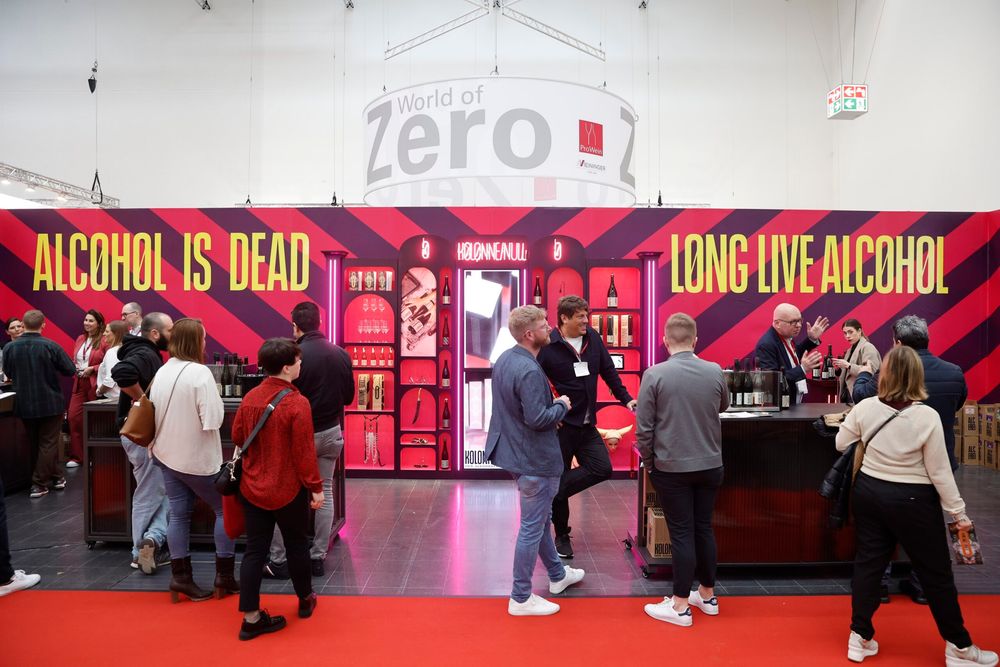
Buyers were out in force looking for low and no alternatives at the show, particularly for the UK with the imminent changes to alcohol duty that favours wines below 11.5% abv.
As well as alternative packaging the feedback from producers was the major UK buyers and big supermarket players had two things on their agenda. Low alcohol wines and how they can still make a quality wine at below 11.5% and not be hit by higher duty levels when the new alcohol duty rules start to be introduced from August 1.
Pierre Nortje, international sales manager at Spier, one of South Africa’s fastest growing producers, said Spier had lots of discussions with major UK retailers about what it can do around 8.4% and 9% abv and at 0%. Those are the two areas where they want to see the most innovation, and it will have a direct impact on how it farms in the future to bring those alcohol levels down, he added.
The low and no alcohol category also received a massive boost at ProWein with Kylie herself on hand to promote her new 0% rosé sparkling with Benchmark Drinks. If it has the kind of impact her existing wines have had, which has seen her sell 8m bottles in three years and become the number one Prosecco rosé brand in the UK, then the low and no category could be stepping up a gear.
She assured a ProWein press conference that the focus of the brand was not just to have a 0% alcohol brand, but to have one “that tastes good” and that consumers would buy because it is a good drink and not just because it is alcohol free.

Kylie Minogue was joined by Benchmark Drinks’ Paul Schaafsma at a packed press conference at ProWein to talk about her journey into wine and how she hopes the quality of her wine stands out more than the potential of her star appeal
Yes, they might buy it because it’s from Kylie the first time round, but it has to be of great quality for them to come back and buy a second time, said Paul Schaafsma, managing director of Benchmark Drinks. It’s also a wine she wants to drink herself.
Copestick at Freixenet Copestick, said he had mixed feelings about the duty changes as “50% of him is confident” they will give a big advantage to sparkling wine producers and “could be a winner” for the Prosecco category that “can easily make Prosecco at 10.5% and 11%”.
Clearly a major bonus, he admitted, for the biggest sparkling wine player in the UK market, owner of English sparkling wine producer, Bolney and is itself owned by Henkell Freixenet, the world’s number one sparkling wine producer.
“We also see the opportunity for making lower alcohol wines which will suit some of our brands. Spier has some really delicious wines at around 9%,” he added. “We will need to communicate the alcohol level clearly to consumers. It also opens up opportunities for UK still wine – half of Bolney’s production is in still wine where it can naturally make Pinot Noir at 11%.”
Sustainability push
Making, importing and selling wine more sustainability was another key theme at the fair with producers and buyers alike both looking at ways they can hit their carbon and sustainability targets by working better together.
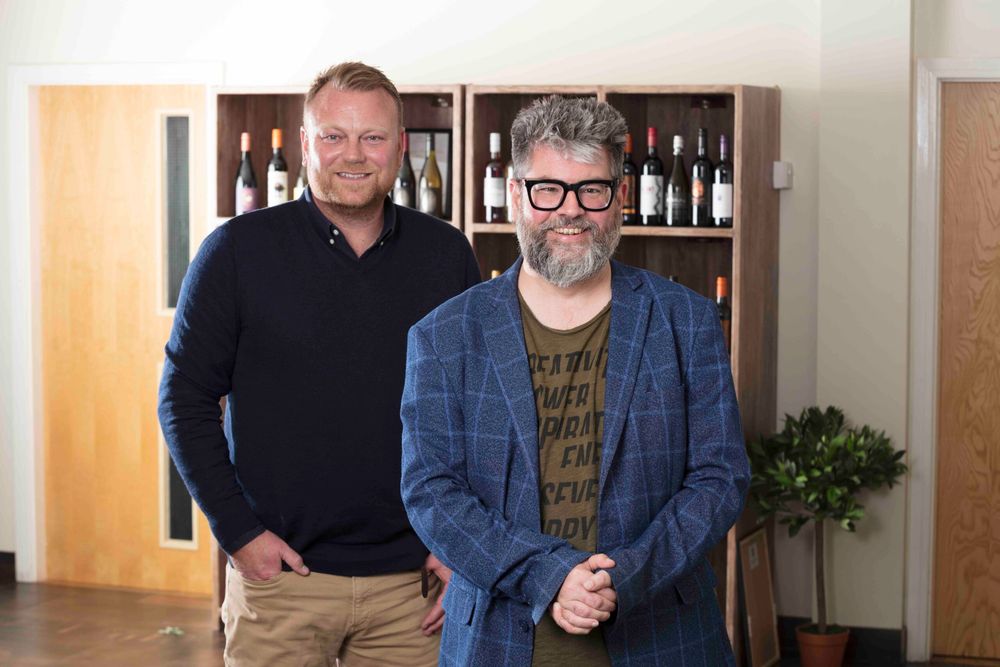
Lanchester’s Mark Roberts and Andrew Porton were able to set out its sustainability credentials at the show
The Lanchester Group was very much on the front foot at the show talking about how far it has come pioneering new sustainability technology and the fact it is building what it claims is the most sustainable building of its size in the world to house its three businesses, Lanchester Wines, Greencroft Bottling and Wine Fusion.
Which also involves working with its producers at the show to ensure they are as sustainable as possible. “Everyone of our bulk suppliers has a properly defined strategy around sustainability and ethical working,” said sales director, Mark Roberts.
Andrew Porton, managing director of Lanchester’s wine division, said it was particularly “excited” about the quality of bulk wine – or boutique bulk as he calls it – that Lanchester and Wine Fusion is now working with producers to bring to the market.
“Wine Fusion has opened so many more doors for us and allows us to offer customers more bulk parcels options,” added Roberts.
Raising your game with bulk wine also helps you navigate your way through all the major glass shortages around the world, said Porton. “It gives you so much more flexibility and gives you the ability to offer consistency of supply when things hit the fan. UK retailers are looking increasingly for a one stop shop that can source, pack and manage their wine supply. We are one of the few places in the UK where you can all of that under one roof.”
“Which is why this is the best show for us by a mile,” added Roberts. “We can get lots of sourcing and exports down here. The bulk of our customers are here from Chile, France to Australia.”

Room for another? The Buyer was able too make use of all the accommodation options at ProWein
In summary
Johnson said he came away from ProWein in a more positive mood than he expected on the back of the Budget and UK duty rises. He said: “Despite everything the UK government are doing to make it difficult there is still a big appetite from suppliers across the southern hemisphere (and US) to work and develop long term sustainable business within the UK.”
Dennis added: “My final thought was this year more than ever, there are big business discussions happening in the most unobvious of places. For me, it’s always encouraging to see the small stands with family growers agreeing highly strategic and market-leading deals vs the courting and small talk that happens on some of the larger stands.”
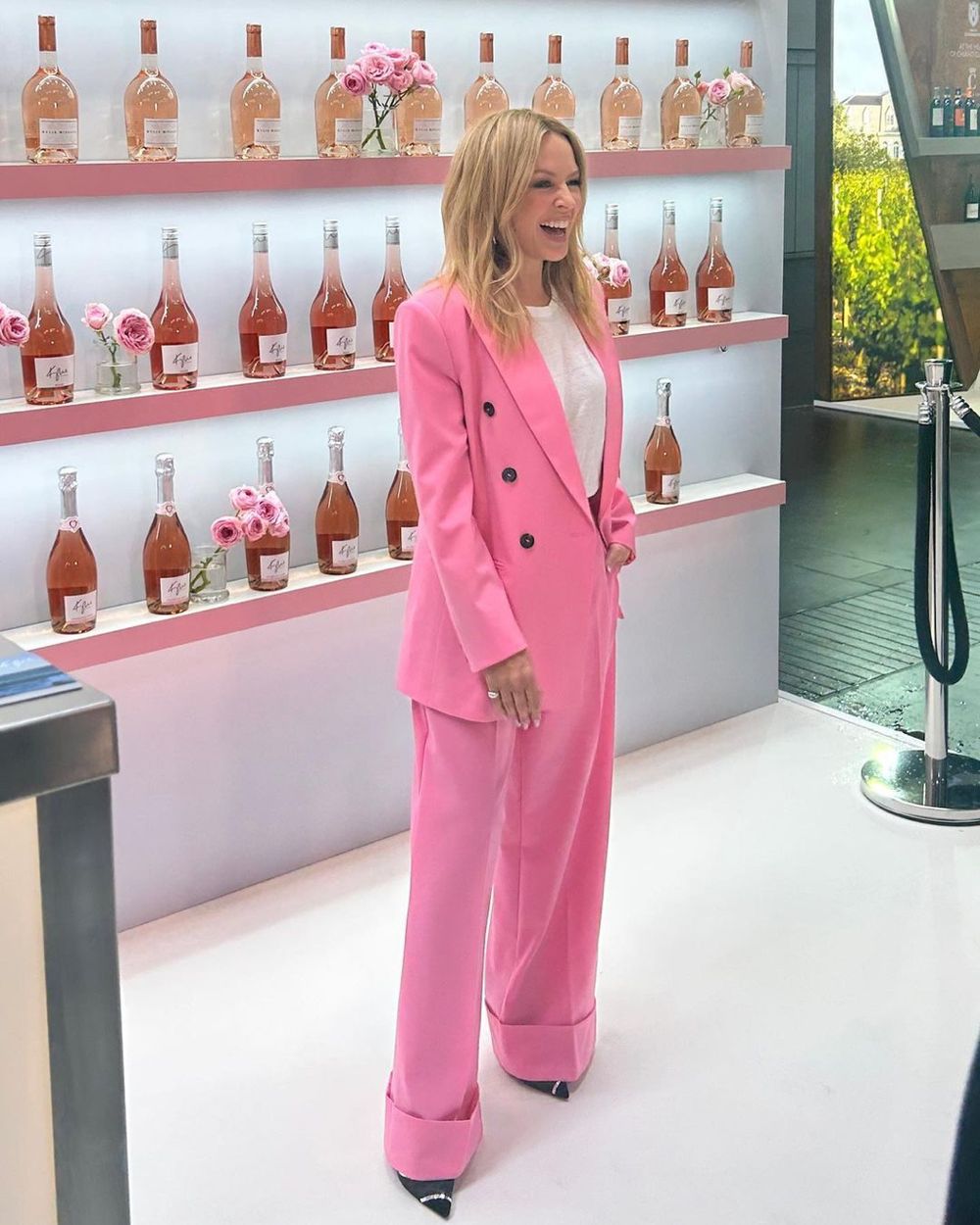
The last word has to go to Kylie Minogue at ProWein 2023 – “there is always something to learn about wine. We are all beginners really”.
The last word has to go to Kylie Minogue, who not only graced the show with her presence but charmed the gold pants of it too. She said not only was it the first trade fair she had ever been too, but said it was quite a humbling experience to be “the baby” in a new industry and was so grateful that she “has been welcomed into this world”.
“I would not be doing it if it was not a passion,” she added stressing she was completely committed to knowing and understanding how the wine industry works and although it’s all “brand new” to her she “is very involved and very passionate about learning and developing” and that she “is in it for the long run”.
Which if her winers keep bringing new people into the category can only be good news for us all.
But as she says herself – “there is always something to learn about wine. We are all beginners really”.
Which pretty much sums up the ProWein experience where we all get to learn, reset and work out how to go again.
- Part 2 of The Buyer’s analysis of Prowein 2023 with a particular focus on the return of South Africa and Australia producers to the show will be published later in the week.



